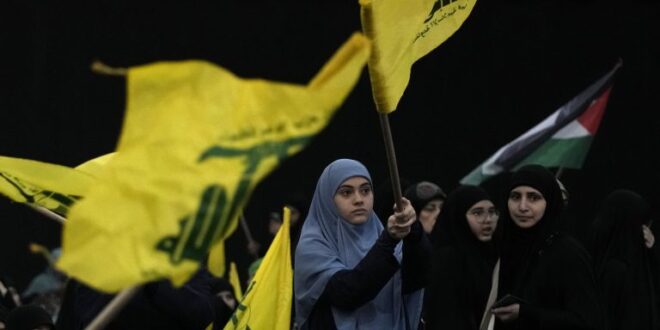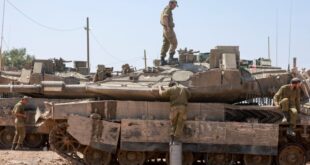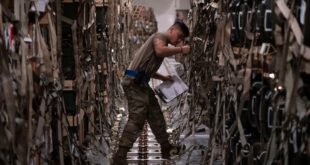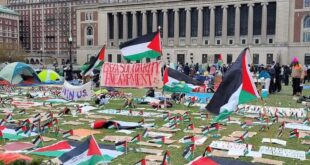The Israel–Hamas war has confirmed the ability of non-state actors, even more so than governments in some cases, to determine the course of events in the region.
Unlike governments, regional non-state actors recognize few constraints on their behavior, in part because most militias, terrorist groups, and insurgent factions do not feel responsible for the welfare of national populations.
New technologies, such as sophisticated armed drones, provide regional militia factions with almost as much combat effectiveness as their national governments.
Global powers struggle to use traditional policy tools to counter or hold accountable non-state actors, who operate outside the global financial system and established diplomatic channels.
The regional conflagration that has raged in the Middle East region since the October 7 Hamas attack on Israel starkly illustrates the degree to which non-state actors primarily, but not exclusively, backed by Iran, have supplanted governments as the key drivers of security and political events in the area. The active regional responses to Israel’s offensive in Gaza have been led not by national governments, who have universally condemned Israel’s prosecution of the war against Hamas, but by militia factions whose leaders occupy no national governing positions. Hamas, whose attack caused the outbreak of war, is itself a non-state actor that at no time has led the Palestinian Authority (PA) – whose role approximates that of a state – although Hamas political leader Ismail Haniyeh served as prime minister of the PA during 2006-07. Hamas has been the de-facto governing authority of the Gaza Strip enclave since forcibly seizing power there in 2007.
Hamas’ ally, Lebanese Hezbollah, has acted against Israel as a show of support for Hamas and to presumably tie down a significant contingent of Israel Defense Forces (IDF) troops and complicate its offensive in Gaza. To date, combat between Israel and Hezbollah has primarily consisted of artillery and rocket exchanges and Israeli airstrikes on key Hezbollah targets in parts of southern Lebanon. However, Hezbollah is clearly the most powerful political and military entity in the country, and Lebanon’s senior governing leaders have openly acknowledged that they can not necessarily act to stop Hezbollah from escalating to the point where major combat erupts with Israel. Years of U.S., French, and Arab aid to the Lebanese Armed Forces have failed to empower the military to the point where it can constrain Hezbollah’s actions or disarm it. As a result, Hezbollah is capable of embroiling the Lebanese population in a war that most of its communities do not want and which could, as happened in 2006, inflict major damage on Lebanon’s infrastructure and economy. Similarly, Iran-backed militias in Iraq, which operate in Syria as well, do not hold parliamentary majorities or leadership positions in Baghdad. Yet, supplied with rockets, short-range ballistic missiles, and armed drones by the Islamic Revolutionary Guard Corps (IRGC), the militias have, without any authorization by Iraq’s leaders, attacked U.S. bases in Iraq, Syria, and Jordan, prompting U.S. retaliatory air strikes on Iraqi facilities.
Similarly, there are no political or military obstacles to the ability of another Iran-backed non-state actor, the Houthi movement in Yemen, to embroil the country’s population in conflict. In the context of the Gaza war, the Houthis have brought the country into conflict with the United States and its allies, mainly like-minded major European powers, who are countering the Houthi threat to freedom of navigation through the Red Sea. The Houthis seized much of northern and central Yemen by force a few years after the Arab Spring uprisings of 2011, ousting the Republic of Yemen Government from the capital, Sanaa, in 2014. Yet, the United Nations still recognizes the Yemen government as the legitimate political authority in the country, even though it is confined mostly to its southern stronghold in and around Aden. Although much of the Yemen population has applauded the Houthis’ action in support of Hamas and against Israel’s global backers, the Yemen government has criticized the Houthis’ attacks on shipping as impeding the delivery of humanitarian aid to the people and provoking U.S.-led air strikes that damage the country’s already dilapidated infrastructure. Yet, the military balance is not favorable to government forces, and neither Aden, its military and financial backers among the Gulf states, nor any mediator can compel the Houthis to de-escalate. Armed with a large arsenal of missiles and armed drones supplied by Iran, the Houthis have similarly been able to deter their Arab governmental adversaries, Saudi Arabia and the United Arab Emirates (UAE), from re-engaging in ground combat against them.
Iran-backed factions are not the only non-state actors that have been able to roil the region. One powerful actor, eastern Libya strongman Khalifa Haftar, who controls a virtual state-within-a-state in eastern Libya, remains ensconced in Benghazi, contending for power with the UN-backed administration in Tripoli that runs western Libya. From that perch, he has been able to seize control of some state-owned oil production assets as an independent source of revenue for his Libyan National Army (LNA), and he has engaged in illicit arms trafficking and precious metals smuggling deals with Russia’s Wagner Group and its successors, and the UAE. Haftar has allowed his bases to be used by Russia and the UAE to furnish weaponry to another non-state actor, the Rapid Support Forces (RSF) in Sudan, which has been in combat against Sudan’s national armed forces for the past year. The two forces have been unwilling to reach a settlement despite extensive mediation by Saudi Arabia and other regional and international actors, causing vast flows of refugees and a humanitarian disaster that shows no signs of easing.
The emergence of non-state actors as significant powers, rivaling or exceeding the influence of national governments, has created new and difficult policy problems for major powers and mediators trying to de-escalate the region’s conflicts. Combatting non-state actors has become more difficult in recent years because they have been equipped with inexpensive yet still sophisticated weaponry, such as armed drones, supplied by Iran, Türkiye, or other powers. Non-state actors do not need large manufacturing or assembly facilities or large revenue streams to field these weapons and demonstrate significant combat power. The Houthis have even begun to deploy unmanned surface vehicles (“sea drones”), some of which have been destroyed by U.S.-led airstrikes and none of which has yet damaged a U.S. or allied warship or a commercial ship. Still, similar systems fielded by Ukraine have sunk several Russian Black Sea fleet vessels, and U.S. military officials judge the system as a significant threat to U.S. and allied maritime security operations in the Red Sea.
Non-military policy tools that major powers use against nation-states have also shown limited utility against non-state actors. Non-state actors generally operate outside the global financial system, rendering traditional economic sanctions relatively ineffective as a policy tool. Many factions operating in the region utilize in-person cash transactions, informal money transfer mechanisms, and illicit revenue-generating operations to pay their members and buy the components they need for their arsenals. Furthermore, many non-state actors do not consider themselves responsible for the economic and social welfare of populations in territories they might control, rendering them somewhat immune from policy instruments intended to constrain their finances. One notable exception has been Hezbollah, which developed a sophisticated social welfare arm to distribute aid to families in the party’s strongholds in southern Lebanon and southern suburbs of Beirut. Most of the major non-state actors in the region have been designated by the United States as terrorist groups, which, despite UN and national carve-outs and exemptions, has the effect of deterring international aid agencies from working in areas controlled by the designated non-state actor. Diplomatically, non-state actors do not control their countries’ foreign embassies. Many of their leaders are inaccessible, compelling global powers, the UN, and other bodies to use regional officials – often with their own agendas – as mediators. Global officials hope that resolving some of the region’s conflicts will strengthen national governments, presumably alleviating some of the instability and conflict fueled by non-state actors.
 Eurasia Press & News
Eurasia Press & News




